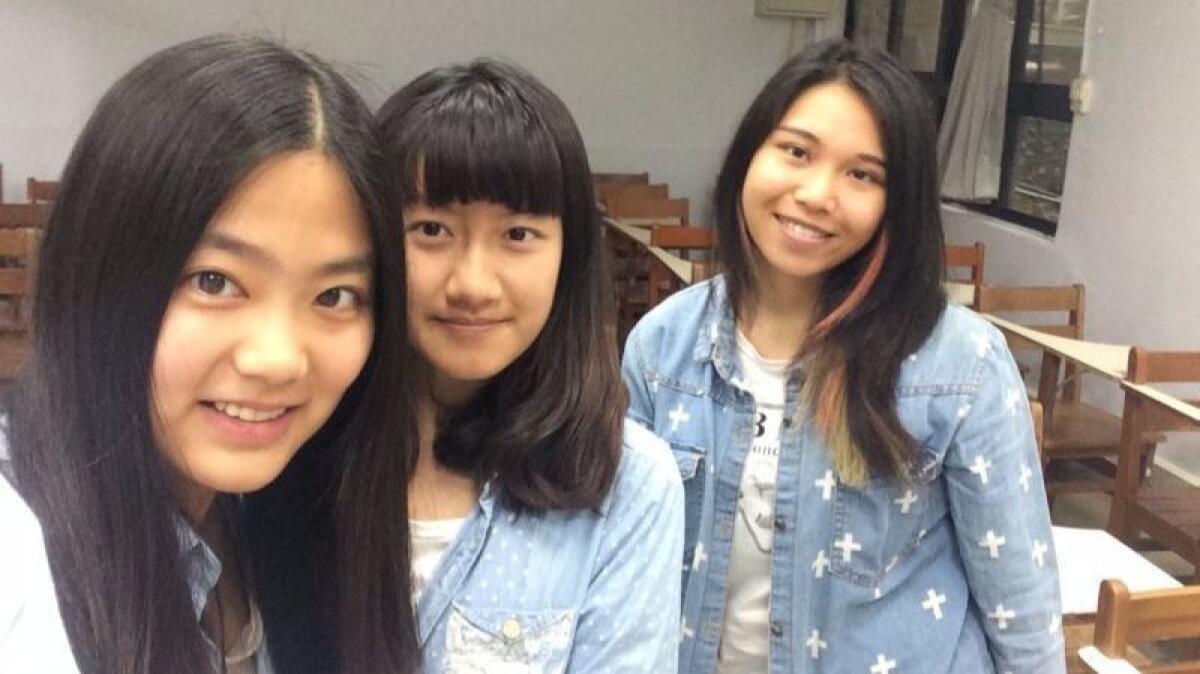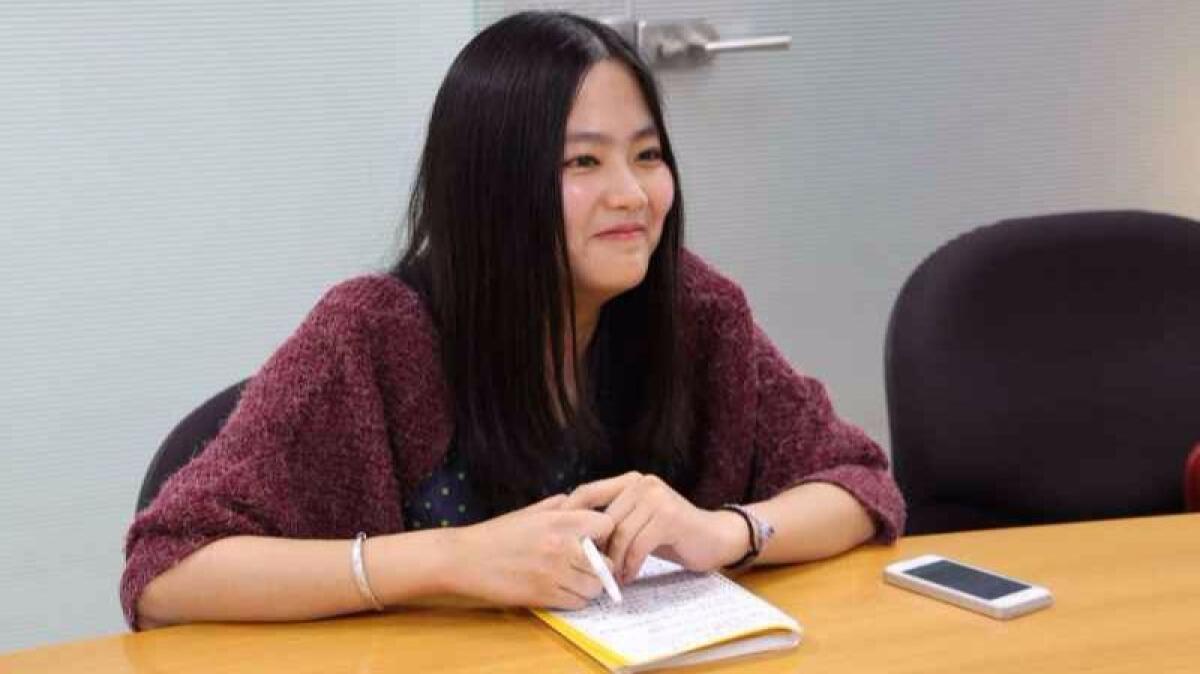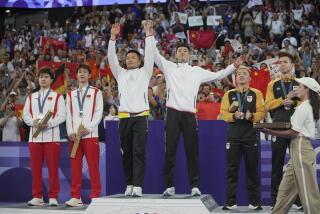For mainland Chinese students, Taiwanâs universities are âlike paradise.â But thereâs a catch

Reporting from TAIPEI, Taiwan â Wang Hao thrived during her semester as an exchange student in Taiwan. As a native of mainland China, she found it exotic to hang out with Taiwanese students, sitting under a thicket of banyan trees and listening to local bands.
Now a fourth-year undergraduate at Dalian University of Technology, Wang wants more people from the mainland to see Ming Chuan University, where she studied in Taipei. So she supports the Chinese governmentâs insistence that Taiwanese schools issue pro-Beijing statements to ensure that they can be trusted politically.
Taiwan and China have been at odds for seven decades and Beijing has never dropped the threat of military force. Taiwanese President Tsai Ing-wen contests Beijingâs idea that her island and China belong under one flag. Her refusal to honor the âone Chinaâ concept irritates the communist leadership and stopped earlier dialogue between the two sides.
Now the dispute is playing out in schools.
More mainland Chinese would come to Ming Chuan University if it would issue a pro-China statement, Wang said. âAlthough itâs very friendly to the students from the mainland and the school environment is also very beautiful, for people who never entered Taiwan, a commitment to China would make them more assured,â she said.

A number of other Taiwanese universities, concerned about declining enrollment and desperate for students from the mainland, have agreed to issue such statements, according to school officials. Taiwanese officials naturally resent the trend, which represents the kind of Chinese economic pressure thatâs also being felt in South Korea, the Philippines and other places in Asia.
Non-degree students, the largest category from China, numbered 32,648 this year, down from 34,114 in the 2015-2016 academic year, according to Taiwanese Ministry of Education data. The decline may be slight, but it comes after years of robust growth that saw their ranks more than double from 2011 to 2013.
Some of Taiwanâs 152 colleges and universities depend increasingly on overseas enrollment as falling birth rates at home threaten local enrollment and tuition income.
Sun Yun, East Asia Program senior associate at the Stimson Center think tank in Washington, says China is effectively wielding a carrot-and-stick strategy â or, as she calls it, âeconomic enticement/punishment.â
China has the worldâs second largest economy after the United States, and a military that is generally considered the third most powerful, after the U.S. and Russia. Its expansion in the South China Sea over the last decade has worried governments throughout Southeast Asia, turning some toward the United States and even Japan for military aid.
You get to say what youâre thinking and they respect that. It changed me.
— Liu Xinyue, a third-year student from Chinaâs Jilin province
But China has used a combination of rewards and threats to keep other countries in its orbit.
In October, China offered the largely impoverished Philippines $24 billion in aid and investment pledges after President Rodrigo Duterte agreed to lay aside a South China Sea sovereignty dispute. Duterteâs predecessor had taken the dispute to a world arbitration tribunal, which ruled in Manilaâs favor last year.
Meanwhile, China has punished South Korea with de facto economic sanctions after Seoul agreed to accept a U.S. antimissile defense system known as THAAD. The Terminal High Altitude Area Defense system is intended to repel an attack by North Korea, but China views it as a threat.
Group tourism from China to Taiwan fell 30% between May and December in what many on the island called an early warning to Taiwanâs president. Tsai took office in May.
Now perceptions of Chinaâs insistence that Taiwanese universities take pro-China pledges have put the Tsai government in a tough spot between standing up to Beijing politically and minding the domestic economy.
The issue started with provincial governments in China, said Nathan Liu, a student recruiter and an international affairs and diplomacy professor at Ming Chuan University. They fear irritating the Chinese central government by sending over too many students while Tsai is in office, he said.
As many as a third of Taiwanâs universities, according to local media, have pledged to avoid activities that will expose the students to anti-China politics.
âWe have a very simple statement,â said Albert Kuo, newsletter editor at the islandâs top school, National Taiwan University. âIf you touch the political issue, it will cause trouble between two sides.â
The year-old statement from the university with more than 300 mainland Chinese students specifies that they come for cultural exchange and education, Kuo said. He added that the mainland students find the experience to be âlike paradiseâ because âour freedoms are very widespread.â
The campus has a club for mainland students, some of whom volunteer to help Taiwanâs low-income indigenous children.
Liu Xinyue, a third-year broadcast production undergraduate from Chinaâs Jilin province, found it hard to get permission for study in Taiwan and was frightened by a prep session warning about exposure to differing political views. Once in Taiwan for the second semester of 2016, she found friends who showed her around and she felt safe expressing political views.
âI didnât feel any hostilities like discrimination,â she said, recalling political discussions in her Taipei campus library and dining hall. âYou get to say what youâre thinking and they respect that. It changed me. Before you come you can only understand this place through news. You have to be in it to know what itâs like.â
Instructors in Taiwan say students from China study harder and get better scores. âThey tend to raise their hands,â said Liu Yi-jiun, a public affairs professor at Fo Guang University, southeast of Taipei. âIf you assign homework, they will turn in something more than the Taiwanese students.â
Students quickly notice the same schism.
âI knew a lot of friends at Ming Chuan whose favorite thing was music and they established their own bands, or loved painting or had other hobbies,â Wang recalled. âThat made me feel thatâs probably because the students in Taiwan do not have a lot of competitive pressure and employment pressure.â
An Education Ministry official in charge of university affairs said this month that her office was still trying to learn how many schools had issued pro-China statements and how to respond.
The Mainland Affairs Council, a Taiwanese government agency, said in a statement March 15 that it welcomed students from the mainland but that âacademic freedom must be respected and protected and should not for any reason be restricted or harmed.â
Analysts in Taipei expect the government to hold its ground against China despite the push by universities to expand recruitment.
After thousands of tourism industry employees protested in September over the drop in arrivals from China, the government said it would help. But it conceded nothing to China.
But China may avoid stepping too hard on Taiwan to avoid a public opinion backlash that could stymie the communist leadershipâs goal of peaceful reunification.
âThese countries are not willingly following Chinaâs policy,â said the Stimson Centerâs Sun, referring to spots around Asia that had come under pressure. âYou can coerce but cannot make them respect you.â
Jennings is a special correspondent.
ALSO
Former Taiwan president charged with leaking secret information from corruption inquiry
Taiwan demonstrates a newfound love of dogs with a law to stop killing them
Japan considers more muscular military role to counter North Korea
More to Read
Sign up for Essential California
The most important California stories and recommendations in your inbox every morning.
You may occasionally receive promotional content from the Los Angeles Times.










